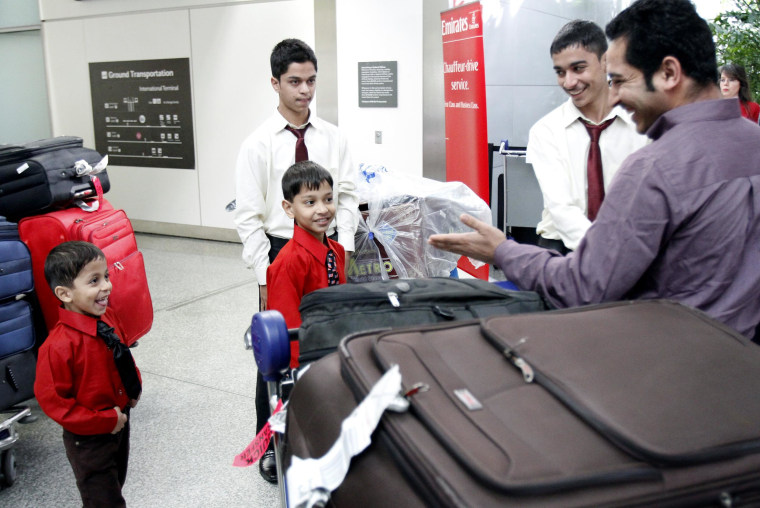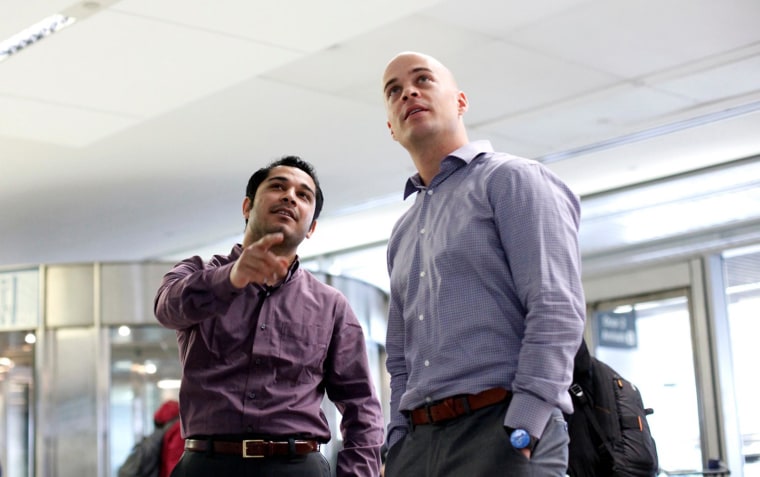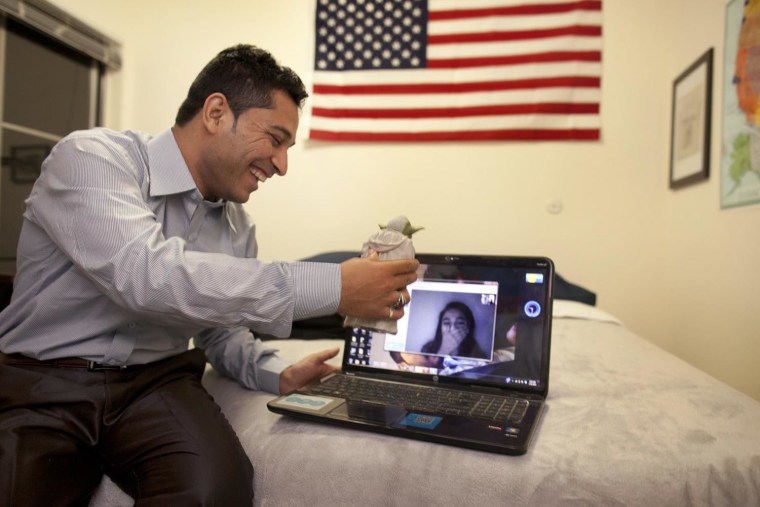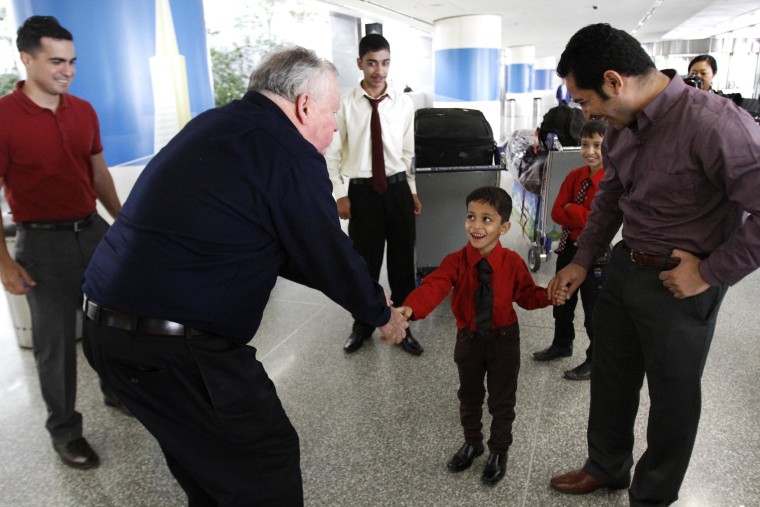An Afghan family forced to make a daring exit from their homeland to elude kidnappers arrived Wednesday in San Francisco to reunite with their eldest son — an ex-Marine interpreter who earlier fled to evade Taliban death threats.
The mother and her seven children, ages 6 to 21, spent about four hours clearing U.S. customs while Mohammad Usafi, 25, waited anxiously outside airport security doors, ready to embrace them for the first time in almost a year.
When those doors finally opened, the full Usafi family gathered in a happy tangle of hugs and tears.
“We've been through a lot,” Usafi said. “I wanted to bring my family back to the normal life, make them understand we are in a world where we can actually live. Our hiding is over."

Usafi had waited those four hours with his one-time employer, Marine Capt. Adrian Kinsella, an Afghanistan veteran, plus several other members of a highly organized network — dubbed "Team Yoda." The group spent most of 2014 working to extract the family from its temporary refuge, a safe house in Pakistan, in a struggle that exposed shortcomings in U.S. policy on Afghans and Iraqis who served the U.S. military in those wars.
In January, Kinsella also completed a nearly four-year effort to rescue Usafi, once a trusted translator nicknamed "Yoda" by Kinsella's platoon. Usafi's job with U.S. forces had infuriated the Taliban. Its members sought retribution by murdering Usafi's father, abducting his little brother and threatening to kill Usafi.
"I feel like I got my guy out, and I got my family out, too," said Kinsella, 29, a Tillman Military Scholar studying at the UC Berkeley School of Law. He spoke to NBC News as a private citizen.
"For us, it’s finishing that mission. It's been a long four years."
NBC News chronicled Usafi’s journey to the United States and his first few months spent meeting America.

The Usafi family's escape this week marked perhaps their most dangerous hours. Once they received their U.S. travel vouchers, allowing them to fly from Kandahar to Northern California, they knew they were targets.
Unknown enemies, from terrorists to corrupt border guards to even distant cousins, could snatch them for ransom. To stay alive, the family had to slip unnoticed from their Pakistan hideout on Sunday then drive 10 hours back into Afghanistan.
In the Berkeley home they shared this year, Kinsella and Usafi nervously waited together as the clan set out for Kandahar.
“We don’t know who they may run into, who may ask questions, who may demand money,” Kinsella said several days ago. “Anything can happen.”
“They're worried because the enemy can attack them easily now," added Usafi, who spoke to his family daily via Skype. "They’re in a place where no one can save them. In this moment, they cannot trust anyone. But they have to take this risk.”
Their life had become "like a prison," Usafi said. After fleeing to Pakistan nearly four years ago, they huddled first in a rental house then at an apartment. The kids always stayed inside. The mother only bought groceries after dark. They feared being found by the Taliban, or by Karachi police who are known to deport Afghan refugees.
To save the family, Kinsella and Usafi forged a national campaign that ultimately included hundreds of core supporters in 27 states.

Their allies spanned senators and congressional members, TV comedian John Oliver, plus experts in immigration law, Web design and social media. More than 93,000 people signed their Change.org petition, urging U.S. officials to swiftly retrieve and welcome the family.
“This large group came together to try to save eight lives,” said volunteer Katharine Celentano, 28, a Columbia University student who handles social media.
“Every day, mortal danger. That’s what’s at stake,” added Celentano. “That’s what continues to be at stake for all of the translators and their families who are not safe. This is simply about fulfilling a promise, doing what we should be doing as Americans.”
Some 12,000 Afghans who worked for American interests during the war still await federal approval on applications for special immigrant visas (SIVs) — papers that would let them dodge retaliation and immediately enter the United States, said Katie Reisner, national policy director for the Iraqi Refugee Assistance Project. The group legally represents refugees seeking resettlement. “Several thousand” Iraqis also remain in the SIV pipeline.
The Afghan SIV program is set to expire at the end of December. The Iraqi SIV program closed in September. But the rise of ISIS “has made the scarce SIVs even more desperately needed,” Reisner said.
While the program allowed Iraqi translators to bring their families to this country, Afghans who held similar jobs can't take parents and siblings with them, Reisner said.
So Kinsella tried what he called his “Hail Mary option.” He applied for humanitarian parole on the family’s behalf.
The U.S. Department of Homeland Security offers humanitarian parole “sparingly,” according to the agency’s website. Candidates are deemed to be people facing “a compelling emergency.”
“From my research, I found out only about 300 people are approved each year,” Kinsella said.
When filing that application, Kinsella attached two previous articles posted by NBC News on Usafi’s plight.
“Look at all these people from all over the country ... everyone offering me help. It means a lot."
On Nov. 13, federal officials granted the family humanitarian parole. On Nov. 19, the U.S. consulate in Karachi handed them their travel documents. Kinsella and Usafi booked them flights, the first scheduled to depart from Kandahar on Monday night, Pacific time. If they made it out, they would travel to Dubai then Shanghai before landing in San Francisco.
An escape plan was hatched: three cars, two decoys and a low profile.
On Sunday, the five brothers crossed the border in one vehicle. A grandfather drove the mother and two daughters into Afghanistan. Another trusted family member chauffeured the family’s bags to Kandahar.
For one day, they hid at a family member’s home, waiting for that final drive to the Kandahar airport.
At 10:46 p.m. Monday, Kinsella emailed NBC News: “And we have takeoff!”
Team Yoda could stand down.
Kinsella will submit an application for their asylum, which would let the family stay permanently. Usafi has secured them a three-month lease at a home in San Jose, a city with a large Afghan population. On Tuesday night, Usafi stayed at that new home, making final preparations for his family. He will live there with them.
“Look at all these people from all over the country, telling me, ‘I’m your big sister’ or ‘your big brother,’ everyone offering me help. It means a lot," Usafi said.
“In Afghan culture, if somebody does something for you, we replace it by doing even more for them. But all this help from all these people? I can never do the same for them. I will try, but I don’t know how to say thank you.”
